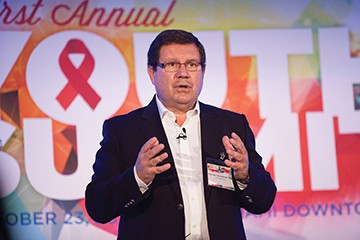
Reputation gains from focussing on the patient
pharmafile | May 11, 2015 | Feature | Manufacturing and Production, Medical Communications, Research and Development, Sales and Marketing | GSK, HIV, Manuel Goncalves, Pfizer, ViiV
Since being spun-off from GSK and Pfizer, specialist HIV firm ViiV Healthcare has earned the best corporate reputation amongst patients for two years in a row. One of its founders, Dr Manuel Goncalves, tells Lilian Anekwe why learning from patients is key to achieving this.
“If you want to talk about something that differentiates us from our competitors, it’s that our only focus is HIV. Other people may be dedicated to it, but not the whole company. This is what I think makes us different.”
In our conversation, Dr Manuel Goncalves mentions that ViiV Healthcare has a ‘100% focus on HIV’ numerous times. Clearly, it’s what he believes sets the company apart from the big pharma firms it competes with (and was spun-off from) – and what is behind its impressive reputational rankings.
When the PatientView Corporate Reputation of Pharma 2014 survey was published in February, patients gave ViiV Healthcare a glowing review: first overall for the second year running, and first in four of the six metrics that pharma firms were measured on.
Similarly, the 1,150 patients surveyed in 58 countries ranked ViiV highest for their patient centricity, patient information and safety record and the usefulness of their products. (Novo Nordisk and AbbVie came joint-second overall, and first for transparency and integrity, respectively.)
So, what’s ViiV’s secret? According to Goncalves – who along with being a founding executive team member is also its head of government affairs, patient advocacy, community partnerships, access and communications – it is the company’s strong links with patients’ groups, researchers and community organisations that work with people with HIV and AIDS.
“We work transparently with patients and practitioners so they can see that we have a common set of goals,” Goncalves says. “Companies have to see our interests as the interests of patients. If the drug we develop does not meet the needs of the patients they have no value.”
This should be a fundamental premise for pharma companies to work to, but Goncalves adds that keeping that uppermost in a firm’s mind – whilst maintaining a good reputation in an industry dogged by scandals and negative perceptions – is a tough nut to crack. “I still don’t know the answer even after working in the industry for 30 years,” he says.
“I think several factors have combined to worsen pharma’s reputation in the minds of patients and consumers. The first is that people generally don’t associate their recovery with a drug, but more often with the care they get from healthcare professionals.
“During the 80s and 90s when there were so many new drugs brought to market, I don’t think the industry did a good job of communicating with patients, and probably focussed too much on practitioners – without realising healthcare is the responsibility of both patients and doctors.
“Now we are in a world where patients are much more educated, so this has led to the poor reputation of the industry. I think all the press about the murky relationship between the industry and healthcare practitioners created a bad environment for the industry, and we should not downplay the effect
it had.”
Reaching out and listening
To overcome the perception of a ‘murky environment’, Goncalves says ViiV goes to great lengths to communicate and engage with the patients it serves and the communities that are most affected by HIV.
Indeed the company has had to do this since it was formed in 2009, when GSK and Pfizer carved out their HIV portfolio to create a specialist company. It was joined in 2012 by Shionogi, the Japanese developers of several novel HIV medicines.
After ViiV’s creation, Goncalves’ first job was to convince the HIV patient and research community that the two pharma giants remained committed to research into new drugs.
“When ViiV was created I was contacting HIV advocates and they were very clear that we had to answer one simple question: ‘Does the creation of ViiV mean that GSK and Pfizer are stepping out of HIV?’ They were worried, because patients with a chronic disease – as HIV is today – know they need constant innovation. There are still a significant number of unmet needs and research into new products has to come from the pharma industry.
“Each time a patient group wants to talk to us, we are always available. Because we are 100% focussed on HIV, our success depends on listening to them. If we fail we don’t have a back-up; we can’t say ‘well, HIV is not doing very well, but our respiratory or cardiovascular products are compensating’.
We have to have an interest in them and improving – as much as possible – the lives of people living with HIV. And I think patient groups feel that from us, that’s how we make our focus on HIV tangible for patients.”
Goncalves says an example of how patients have influenced company decisions is in the design of its clinical trials. During the planning, ViiV bosses decided to make changes to the agreed patient population of the Phase IIb SPRING-1 study (of once-daily Tivicay (dolutegravir) in combination therapy in antiretroviral-naive adults with HIV) as a direct response to the feedback it gained from engaging patient groups.
“Patients know better how to do population selection and where to recruit patients for clinical trials that are significant and meaningful for the future of the product. That is where they make very valuable contributions to us,” he explains.
ViiV also consulted patient groups when deciding on its corporate social responsibility strategy. They held a six-month engagement process with groups including the European AIDS Treatment Group (EATG), and the AIDS Treatment Activists Coalition (ATAC) in the US, to decide on the projects to support. This means “those groups can see their input and their feedback reflected in what we do”, Goncalves says.
Punching above its weight?
It is a big undertaking for what is still a growing company. Unlike its global progenitors ViiV is only present in 15 countries (although it has a distribution agreement with GSK in others), and the length of Goncalves’ job title hints at the breadth of the task. Yet he says ViiV’s size presents opportunities as well as challenges.
“There are positive and negatives of being a smaller, leaner spin-off. We were able to create from scratch a very focussed company. Instead of being in the position of having to cut redundant things we had a blank sheet of paper to work with, and we knew we had exactly the right structures in place, with the right people and the focus on our key priorities.
“But there are challenges from a business point of view; not having the additional infrastructure that a large business has. Yet the benefit of being small is that we have very few layers and decisions can be taken very rapidly, so we are probably – and I stress probably – faster in taking decisions than larger companies.”
The executive team – which still only has 10 members – was given a mandate to revive the HIV products and franchises of GSK and Pfizer and see through the final stages of development and launch of Tivicay and Triumeq (abacavir, dolutegravir and lamivudine).
GSK’s 2014 financial report notes that ViiV Healthcare “continues to perform strongly with sales up 15% in 2014, following the very successful launches of Tivicay and Triumeq”.
The two flagship drugs had combined sales of £339 million in quarter four after a launch performance which was ‘ahead of original expectations’. ViiV earned just short of £1.5 billion in the full year. “We have a saying at ViiV: ‘We want to do well and do good,’” Goncalves says.
“The results from a business point of view speak to the part about doing well; but there are different types of measurements to judge whether we are doing good. One measure is the respect we have gained. We think we have earned our place at the table; we started as an unknown entity in Europe and now we are invited to WHO and the UN and they recognise ViiV. We created our own identity gained by the respect people have for our work.”
In many ways ViiV is punching above its weight against huge competitors, and its brand doesn’t carry the same resonance across the world as its parent companies. But the challenges faced by small and big firms operating in HIV – an infectious yet increasingly chronic disease – are the same.
In December, research led by a team at the University of Oxford and published in the Proceedings of the National Academy of Sciences indicated that the HIV virus has shown ‘a reduction in virulence over time’, due to viral adaptation and the use of antiretroviral therapy.
But the researchers also warned against complacency. Groups including the UK National Aids Trust stress that people with HIV can live for many years on effective treatments – but require support to live with the complications and physical and mental side effects including body shape changes and depression.
The fact that HIV is widely considered a chronic disease creates a different problem for companies and people living with the disease, Goncalves says.
“The challenge for the industry is to come up with, in partnership with other stakeholders, better solutions that make people retain therapy for many years after being diagnosed. In fact, that’s the big challenge for society and industry; around prevention, having treatments that are well tolerated, that people can take for 30 years without abandoning therapy.”
The global problem of HIV
This task has led ViiV to pursue projects globally, and especially in parts of the world heavily affected by HIV. In South Africa ViiV is funding a project targeted at keeping adolescents in treatment programmes and also creating behaviour change in young people.
“Adolescents now are the first beneficiaries of scaling up of therapies in sub-Saharan Africa. In the past children would die at age five or six, but now we have a generation coming into adolescence who have benefitted from treatment. They have very significant and different problems in terms of behaviours – what researchers call ‘conscious non-adherence to therapy’. This describes boys and girls that feel healthy, and think ‘why should I take a pill for the rest of my life? That stigmatises me’.”
Conscious non-adherence to therapy is an active area in HIV research, and ViiV is funding an adolescent research centre in KwaZulu Natal, in partnership with the London School of Hygiene and Tropical Medicine. The centre will conduct research into interventions to change behaviour and will study how to create the right conditions to keep HIV-positive adolescents engaged in their treatment.
ViiV’s other projects in countries within sub-Saharan Africa, Asia and in the US support areas and groups where HIV rates are still rising. This includes girls and young women in sub-Saharan Africa, where young girls aged 12-24 have double the rates of infection of boys and men, and at-risk groups including sex workers and men who have sex with men.
The company has also launched a £2 million fund to support HIV testing and treatment in transgender women – who are one of the most impacted groups in terms of transmission – to back capacity building to improve access to healthcare, and work with community support organisations to encourage early testing.
Goncalves says: “Our company has a motto: ‘leave no patient behind’. For us this means our aspiration is that any patients who may benefit from our products will not be precluded from benefitting from financial or logistical reasons.”
Providing access to HIV treatments to all groups in need requires more than just developing drugs and bringing them to market. Even people who are diagnosed may not be retained in care because they may be stigmatised; and some of the biggest stigma they suffer can be within the healthcare environment.
Yet ViiV has achieved commendable gains in this area, and in some countries its programmes provide treatment for 93% of adults and 99% of children with HIV. It’s an uphill battle to overcome the medical and social issues that can arise from stigma and discrimination, which preclude people from testing.
Pharma’s challenge is to gain a good enough reputation to overcome these barriers – and make sure no patient is left behind.
Related Content

GSK shares positive results from phase 3 asthma trials
GSK has announced positive headline results from its phase 3 SWIFT-1 and SWIFT-2 trials, which …

GSK pledges £45m to Fleming Initiative to fight AMR
GSK has announced that it has pledged £45m to the Fleming Initiative, becoming the first …

NHS accepts Pfizer’s tafamidis for ATTR-CM treatment
NHS England has announced that it has accepted Pfizer’s drug, tafamidis, for the treatment of …








